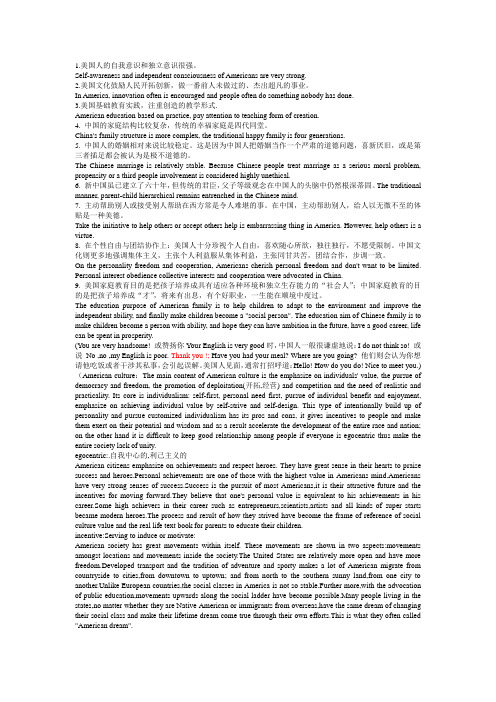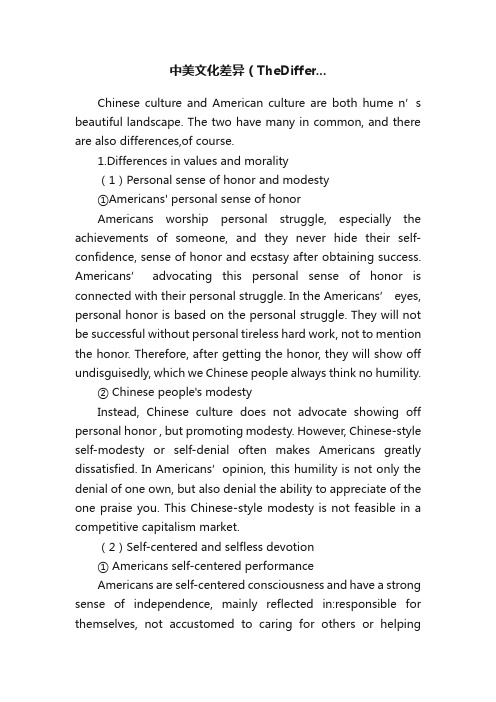中美文化差异(英文版)培训资料
- 格式:ppt
- 大小:1.49 MB
- 文档页数:9

Chinese culture and American culture are both hume n’s beautiful landscape. The two have many in common, and there are also differences,of course.1.Differences in values and morality(1)Personal sense of honor and modesty①Americans' personal sense of honorAmericans worship personal struggle, especially the achievements of someone, and they never hide their self-confidence, sense of honor and ecstasy after obtaining success. Americans’ advocating this personal sense of honor is connected with their personal struggle. In the Americans’ eyes, personal honor is based on the personal struggle. They will not be successful without personal tireless hard work, not to mention the honor. Therefore, after getting the honor, they will show off undisguisedly, which we Chinese people always think no humility.② Chinese people's modestyInstead, Chinese culture does not advocate showing off personal honor , but promoting modesty. However, Chinese-style self-modesty or self-denial often makes Americans greatly dissatisfied. In Americans’opinion, this humility is not only the denial of one own, but also denial the ability to appreciate of the one praise you. This Chinese-style modesty is not feasible in a competitive capitalism market.(2)Self-centered and selfless devotion① Americans self-centered performanceAmericans are self-centered consciousness and have a strong sense of independence, mainly reflected in:responsible for themselves, not accustomed to caring for others or helping others, they don’t asking others’business, as the initiative to help others or accept others’help is often a embarrassing thing in the United States.Because receiving help can only prove their incompetence,and the initiative to help others would be considered interference in other people’s private affairs .② Chinese people's selfless dedicationChina's Code of Conduct is “whether I am useful to society and others ." Personal values are reflected in the dedication out. Chinese culture respected a noble sentiment - selfless dedication. In China, helping others initiatively, giving them considerate care is a virtue.So Chinese people concerned about everything, including personal affairs, family affairs,national affairs, even the world affairs! And this would be regarded as "meddling" in the United States.(3)On individual freedom and solidarity①American individual freedomAmericans cherish individual freedom,like arbitrariness, come alone and go alone,do not want to be restricted.In fact, this has some ties with the United States national conditions.the United States always advocates democracy, promotes freedom and science.In the U.S., the spirit of individualism appeared very early. Harsh living environment developed the American independent personality.Therefore, this independent spirit from the early colonial period has continued ever since, becoming one of the spirits believed in by Americans.②China's unity and cooperationChinese cu lture emphasize on collectivism more, it advocates that individual interests should be subordinated to the collective interests, all members should go together through thick and thin consisitently. Confucius ever said: " Sacrifice our lives for justice ," which is a extreme example to reflects the thoughts of “Weight overall, light individual”.2.Differences in family education(1)Differences between Chinese and American educational tradition① American pays much attention to the practice of basic education and the form of the classroom instruction creationAmerican schools focus on heuristic teaching ,especially in personality development and self-expression, foster students’ operation ability, without emphasis on test scores. In the classroom, teachers guide students to think independently in an active atmosphere. Homework is few and very flexible whose main purpose is to exercise the abilities of students and to develop their thinking habits.② Chinese basic education stresses knowledge, classroom instruction focuses on indoctrinationIn Chinese schools, The schools adopt a unified teaching mode, unified learning content, unified examination and standard answers. This greatly stifle the students' innovative spirit. Under the examination-oriented education model, teachers and students entirely aimed at the examination. Teaching content entirely regards the "Outline" as the basis. In the teaching process, Chinese teachers irrigate blindly, and students take those old-fashioned knowledge by rote.(2)The purpose of the Sino-US Family Education① American families educational expectations are not highThe aim of education of American families is to raise their children to be a "social person" who is able to adapt to a variety of environments . The expectations of this purpose is not high, so the American parents can treat their children's education more easily. Children's positive ingredient in their personality can be exhumed maximally to achieve self-worth.② Chinese families educational expectations are very high, and always with strong utilitarianIn Chinese family, the purpose of education is to train their children to besuccessful , which means they will get a good career, have a great expectations, possess much money ,and their life can always be smooth sailing. For this reas on, Chinese parents are particularly concerned about the child's academic performance. The only requirement for children is to concentrate on learning quietly, ignoring the children’s other talents, limiting their creativity.3.Differences in social etiquette(1)Etiquette① Comparison of Sino-US Politeness WordsChinese people like to ask the name, age ,job ,hometown and so on of each other during their first meet. However , Americans hate people ask such questions like age and income, they think it’s private affair. Chinese people love greeting acquaintances like: Have you eaten ? Where to go? Work ah? And so on. In our view, this is a polite greetings, and if you do it to Americans, they will think you want to ask him to dinner, or interfere in their private affairs, and feel you disrespectful. Americans usually greet this way:”Hello! How do you do?”or”Nice to meet you! ”.② Comparison of attitude to accepting kind words of Sino-US Research shows that Chinese people don’t like to praise themselves. But Chinese-style self-modesty or self-denial often makes Americans greatly dissatisfied.For others’ praise, Chinese people usually express his humility with a humble words like "ashamed", "where", "not so good" and so on. And Americans are always very happy to answer “thank you” to show acceptance.③ Comparison of Sino-US ceremonial occasionsChinese people do not often say "thanks" to close friends and family members. They think you aloof if you do. But Americans use “thank you” all day, even among friends and family members.(2) Customs① Sino-US attitude to giftsChinese people tend to put a gift aside without much looking when he receives a gift, fearing that others say him greedy. Americans always open his gift and claim it’s good in front of the guests immediately.② Sino-US attitude to hospitalityChinese people is quite hospitable, persuading guests to eat dishes or drink wines over and over again on the table, which Americans find difficult to deal with. The American habit is: Please help yourself! when China sent to the guests, the host usually say:! “Be careful, good-bye, go well”. The Americans only say “Bye! See you later!”In short, the American culture is outgoing culture which is built on the rule , while Chinese culture is introverted culture which is built on the culture.。




1.美国人的自我意识和独立意识很强。
Self-awareness and independent consciousness of Americans are very strong.2.美国文化鼓励人民开拓创新,做一番前人未做过的、杰出超凡的事业。
In America, innovation often is encouraged and people often do something nobody has done.3.美国基础教育实践,注重创造的教学形式.American education based on practice, pay attention to teaching form of creation.4. 中国的家庭结构比较复杂,传统的幸福家庭是四代同堂。
China's family structure is more complex, the traditional happy family is four generations.5. 中国人的婚姻相对来说比较稳定。
这是因为中国人把婚姻当作一个严肃的道德问题,喜新厌旧,或是第三者插足都会被认为是极不道德的。
The Chinese marriage is relatively stable. Because Chinese people treat marriage as a serious moral problem, propensity or a third people involvement is considered highly unethical.6. 新中国虽已建立了六十年,但传统的君臣,父子等级观念在中国人的头脑中仍然根深蒂固。
The traditional manner, parent-child hierarchical remains entrenched in the Chinese mind.7. 主动帮助别人或接受别人帮助在西方常是令人难堪的事。

中美文化差异(TheDiffer...Chinese culture and American culture are both hume n’s beautiful landscape. The two have many in common, and there are also differences,of course.1.Differences in values and morality(1)Personal sense of honor and modesty①Americans' personal sense of honorAmericans worship personal struggle, especially the achievements of someone, and they never hide their self-confidence, sense of honor and ecstasy after obtaining success. Americans’ advocating this personal sense of honor is connected with their personal struggle. In the Americans’ eyes, personal honor is based on the personal struggle. They will not be successful without personal tireless hard work, not to mention the honor. Therefore, after getting the honor, they will show off undisguisedly, which we Chinese people always think no humility.② Chinese people's modestyInstead, Chinese culture does not advocate showing off personal honor , but promoting modesty. However, Chinese-style self-modesty or self-denial often makes Americans greatly dissatisfied. In Americans’opinion, this humility is not only the denial of one own, but also denial the ability to appreciate of the one praise you. This Chinese-style modesty is not feasible in a competitive capitalism market.(2)Self-centered and selfless devotion① Americans self-centered performanceAmericans are self-centered consciousness and have a strong sense of independence, mainly reflected in:responsible for themselves, not accustomed to caring for others or helpingothers, they don’t asking others’business, as the initiative to help others or accept others’help is often a embarrassing thing in the United States.Because receiving help can only prove their incompetence,and the initiative to help others would be considered interference in other people’s private affairs .② Chinese people's selfless dedicationChina's Code of Conduct is “whether I am useful to society and others ." Personal values are reflected in the dedication out. Chinese culture respected a noble sentiment - selfless dedication. In China, helping others initiatively, giving them considerate care is a virtue.So Chinese people concerned about everything, including personal affairs, family affairs,national affairs, even the world affairs! And this would be regarded as "meddling" in the United States.(3)On individual freedom and solidarity①American individual freedomAmericans cherish individual freedom,like arbitrariness, come alone and go alone,do not want to be restricted.In fact, this has some ties with the United States national conditions.the United States always advocates democracy, promotes freedom and science.In the U.S., the spirit of individualism appeared very early. Harsh living environment developed the American independent personality.Therefore, this independent spirit from the early colonial period has continued ever since, becoming one of the spirits believed in by Americans.②China's unity and cooperationChinese cu lture emphasize on collectivism more, it advocates that individual interests should be subordinated to the collective interests, all members should go together through thick and thin consisitently. Confucius ever said: " Sacrifice ourlives for justice ," which is a extreme example to reflects the thoughts of “Weight overall, light individual”.2.Differences in family education(1)Differences between Chinese and American educational tradition① American pays much attention to the practice of basic education and the form of the classroom instruction creation American schools focus on heuristic teaching ,especially in personality development and self-expression, foster students’ operation ability, without emphasis on test scores. In the classroom, teachers guide students to think independently in an active atmosphere. Homework is few and very flexible whose main purpose is to exercise the abilities of students and to develop their thinking habits.② Chinese basic education stresses knowledge, classroom instruction focuses on indoctrinationIn Chinese schools, The schools adopt a unified teaching mode, unified learning content, unified examination and standard answers. This greatly stifle the students' innovative spirit. Under the examination-oriented education model, teachers and students entirely aimed at the examination. Teaching content entirely regards the "Outline" as the basis. In the teaching process, Chinese teachers irrigate blindly, and students take those old-fashioned knowledge by rote.(2)The purpose of the Sino-US Family Education① American families educational expectations are not highThe aim of education of American families is to raise their children to be a "social person" who is able to adapt to a variety of environments . The expectations of this purpose is not high, so the American parents can treat their children's education moreeasily. Children's positive ingredient in their personality can be exhumed maximally to achieve self-worth.② Chinese families educational expectations are very high, and always with strong utilitarianIn Chinese family, the purpose of education is to train their children to besuccessful , which means they will get a good career, have a great expectations, possess much money ,and their life can always be smooth sailing. For this reas on, Chinese parents are particularly concerned about the child's academic performance. The only requirement for children is to concentrate on learning quietly, ignoring the children’s other talents, limiting their creativity.3.Differences in social etiquette(1)Etiquette① Comparison of Sino-US Politeness WordsChinese people like to ask the name, age ,job ,hometown and so on of each other during their first meet. However , Americans hate people ask such questions like age and income, they think it’s private affair. Chinese people love greeting acquaintances like: Have you eaten ? Where to go? Work ah? And so on. In our view, this is a polite greetings, and if you do it to Americans, they will think you want to ask him to dinner, or interfere in their private affairs, and feel you disrespectful. Americans usually greet this way:”Hello! How do you do?”or”Nice to meet you! ”.② Comparison of attitude to accepting kind words of Sino-US Research shows that Chinese people don’t like to praise themselves. But Chinese-style self-modesty or self-denial often makes Americans greatly dissatisfied.For others’ praise, Chinese people usually express hishumility with a humble words like "ashamed", "where", "not so good" and so on. And Americans are always very happy to ans wer “thank you” to show acceptance.③ Comparison of Sino-US ceremonial occasionsChinese people do not often say "thanks" to close friends and family members. They think you aloof if you do. But Americans use “thank you” all day, even among friends and family members.(2) Customs① Sino-US attitude to giftsChinese people tend to put a gift aside without much looking when he receives a gift, fearing that others say him greedy. Americans always open his gift and claim it’s good in front of the guests immediately.② Sino-US attitude to hospitalityChinese people is quite hospitable, persuading guests to eat dishes or drink wines over and over again on the table, which Americans find difficult to deal with. The American habit is: Please help yourself! when China sent to the guests, the host usually say:! “Be careful, good-bye, go well”. The Americans only say “Bye! See you later!”In short, the American culture is outgoing culture which is built on the rule , while Chinese culture is introverted culture which is built on the culture.。








